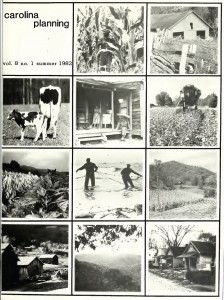 Volume 8.1 Rural Planning (1982)
Volume 8.1 Rural Planning (1982)
In describing the nature of this state or this region, the term ‘rural’ is somewhat less than illuminating. To the Census Bureau, places with less than 2,500 residents are rural. With the ‘population turnaround’ of non-urban growth across the nation, the 1980 Census may be interpreted to show a phenomenal rediscovery of rural living in North Carolina and elsewhere. Alternately, some observers interpret recent ‘rural’ growth as the latest stage in the nation’s urban settlement pattern. They point out that good roads have opened up once-remote areas to commuter lifestyles, that sprawl and low-density settlement are today’s urban development patterns, that farming and other traditional rural occupations continue to decline despite the rural population shift. With these conflicting characterizations and semantic warnings in mind, Carolina Planning presents this special issue on rural planning.
Editors: Dan Stroh, Priscilla Cobb, and John Gaadt
A digital version of this issue is available here.
| EVALUATING ALTERNATIVE RURAL LAND USE POLICIES
Danielson, Leon The author provides an economist’s perspective on various rural land use policies and tools used by planners to preserve agricultural lands. |
| FARMLAND PRESERVATION: LESSONS FROM ORANGE COUNTY
McElyea, William This piece describes the development and potential effectiveness of the Orange County, North Carolina, Farm Preservation Program, which tried to provide a range of economic and agricultural preservation tools to planners in North Carolina. |
| OREGON’S SENATE BILL 100: ONE STATE’S INNOVATIVE APPROACH TO THE PROTECTION OF FARMLAND
Beatley, Timothy The author provides a brief overview of the agricultural preservation tools available to planners in the state of Oregon, often considered the leading state in the field of comprehensive land management systems. |
| MIGRANT FARMWORKERS – THOSE WHO WOULD BE SAVED
Buckwalter, Jane The author provides a synthesis of recent studies on migrant farmworkers, pointing out the compelling need for public intervention in this area. |
| PROGRESS IN THE SEARCH FOR TOBACCO ALTERNATIVESEvers, Kathy; Faust, GinnyThe authors examine new strategies for farmers seeking alternatives to tobacco, and illuminate ways in which local planners may help farmers make the switch. |
| WATER SUPPLY AND THE URBAN-RURAL CONFLICT
Shambaugh, Julie This piece highlights urban-rural equity issues through a brief synopsis of a complex water supply situation in Orange County: the proposed Cane Creek reservoir project. |
| CAN RURAL COUNTIES COPE WITH RECREATION-INDUCED DEVELOPMENT? WESTERN NORTH CAROLINA’S RESPONSE
Mack, Joanna The author looks at the planning response to recreation-induced land use changes in Western Appalachian counties, and suggests some of the underlying causes of the patterns of response and areas for improvement. |
| NEW STRATEGIES FOR RURAL ECONOMIC DEVELOPMENT
Malizia, Emil; Rubin, Sarah The authors report on the results of a seven-state survey of local economic development strategies for rural and small town areas. The study identifies locally controlled and based approaches to rural economic development through methods that may be effective without the infusion of federal aid. |